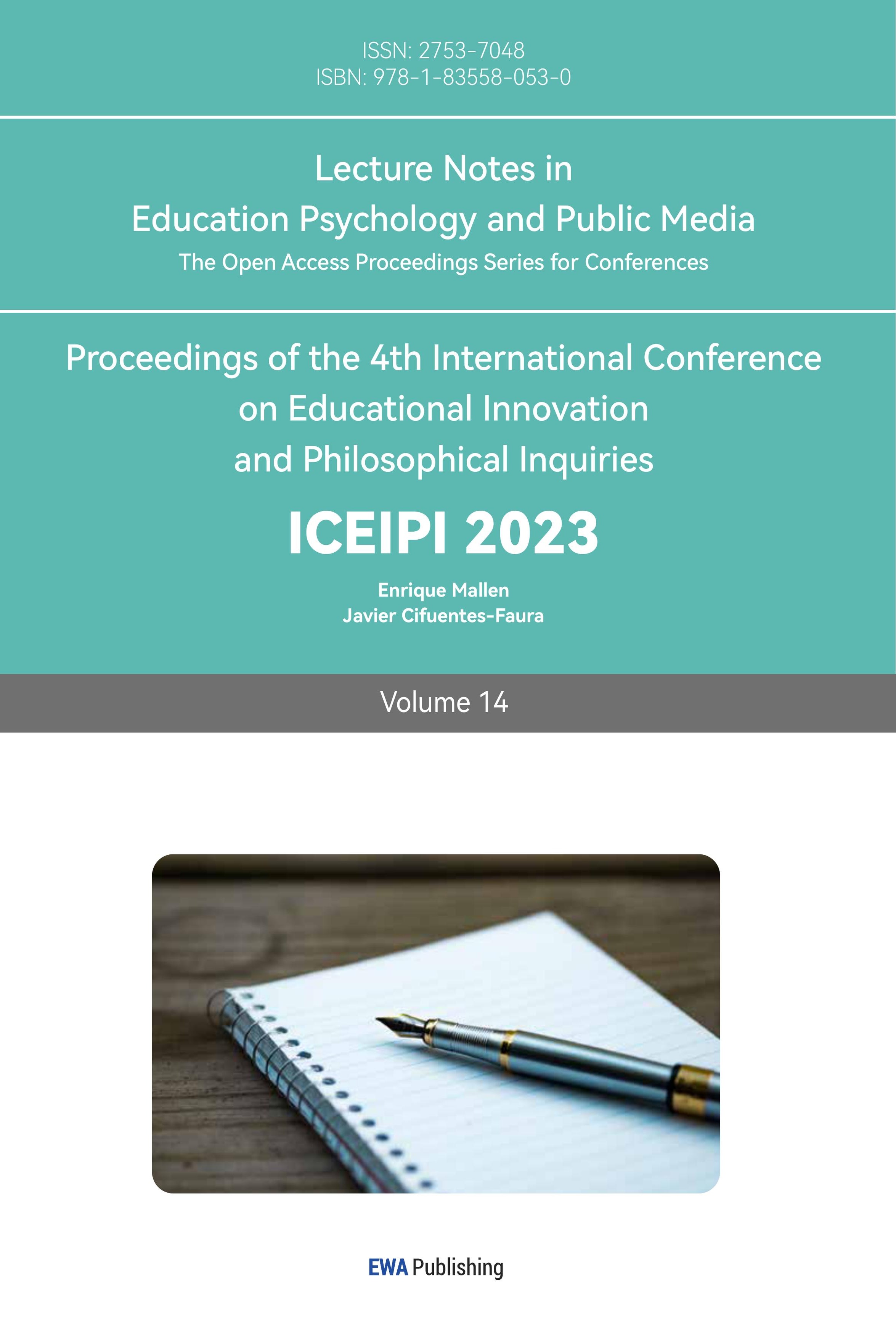References
[1]. Gambin, L. and Hogarth, T. (2017). Employers and apprenticeships in England: costs, risks and policy reforms. Empirical Res Voc Ed Train 9, 16.
[2]. Guan, J. (2010). Study on Western Apprenticeship System. East China Normal University 12, 1-220.
[3]. Ma, S. C. and Fan, W. (2008). A new understanding of higher vocational education with Chinese characteristics. China Higher Education 400, 53-55.
[4]. Aggarwal, A. and Aggarwal, G. (2021). New Directions for Apprenticeships. In: Ra, S., Jagannathan, S., Maclean, R. (eds) Powering a Learning Society During an Age of Disruption. Education in the Asia-Pacific Region: Issues, Concerns and Prospects, vol 58. Springer, Singapore.
[5]. Li J. and Li D. S. (2019). International comparative analysis of industry-education integration in vocational education-China, Germany and the United Kingdom as examples. Research on Higher Engineering Education 177(04), 159-164.
[6]. Pilz, M. and Wiemann, K. (2021). Does Dual Training Make the World Go Round? Training Models in German Companies in China, India and Mexico. Vocations and Learning 14, 95–114.
[7]. Li, W. and Huang, J. (2012). Planning and Development of Higher Vocational Education Institutions in China: Problems and New Policies. J Glob Policy Gov 1, 109–115.
[8]. Ling, Y., Chung, S. J. and Wang, L. (2023). Research on the reform of management system of higher vocational education in China based on personality standard. Curr Psychol 42, 1225–1237.
[9]. Kirchknopf, S. (2020). Career Adaptability and Vocational Identity of Commercial Apprentices in the German Dual System. Vocations and Learning 13, 503–526. https://doi.org/10.1007/s12186-020-09247-z.
[10]. Wang, Z., Fan, C. and Niu, J. (2023). Predicting effects of career adaptability and educational identity on the career decision-making of Chinese higher vocational students. Int J Educ Vocat Guidance.
Cite this article
Liu,Y. (2023). The Application of Apprenticeships in Germany and the United Kingdom to the Reform of Chinese Vocational Education and Training. Lecture Notes in Education Psychology and Public Media,14,27-32.
Data availability
The datasets used and/or analyzed during the current study will be available from the authors upon reasonable request.
Disclaimer/Publisher's Note
The statements, opinions and data contained in all publications are solely those of the individual author(s) and contributor(s) and not of EWA Publishing and/or the editor(s). EWA Publishing and/or the editor(s) disclaim responsibility for any injury to people or property resulting from any ideas, methods, instructions or products referred to in the content.
About volume
Volume title: Proceedings of the 4th International Conference on Educational Innovation and Philosophical Inquiries
© 2024 by the author(s). Licensee EWA Publishing, Oxford, UK. This article is an open access article distributed under the terms and
conditions of the Creative Commons Attribution (CC BY) license. Authors who
publish this series agree to the following terms:
1. Authors retain copyright and grant the series right of first publication with the work simultaneously licensed under a Creative Commons
Attribution License that allows others to share the work with an acknowledgment of the work's authorship and initial publication in this
series.
2. Authors are able to enter into separate, additional contractual arrangements for the non-exclusive distribution of the series's published
version of the work (e.g., post it to an institutional repository or publish it in a book), with an acknowledgment of its initial
publication in this series.
3. Authors are permitted and encouraged to post their work online (e.g., in institutional repositories or on their website) prior to and
during the submission process, as it can lead to productive exchanges, as well as earlier and greater citation of published work (See
Open access policy for details).
References
[1]. Gambin, L. and Hogarth, T. (2017). Employers and apprenticeships in England: costs, risks and policy reforms. Empirical Res Voc Ed Train 9, 16.
[2]. Guan, J. (2010). Study on Western Apprenticeship System. East China Normal University 12, 1-220.
[3]. Ma, S. C. and Fan, W. (2008). A new understanding of higher vocational education with Chinese characteristics. China Higher Education 400, 53-55.
[4]. Aggarwal, A. and Aggarwal, G. (2021). New Directions for Apprenticeships. In: Ra, S., Jagannathan, S., Maclean, R. (eds) Powering a Learning Society During an Age of Disruption. Education in the Asia-Pacific Region: Issues, Concerns and Prospects, vol 58. Springer, Singapore.
[5]. Li J. and Li D. S. (2019). International comparative analysis of industry-education integration in vocational education-China, Germany and the United Kingdom as examples. Research on Higher Engineering Education 177(04), 159-164.
[6]. Pilz, M. and Wiemann, K. (2021). Does Dual Training Make the World Go Round? Training Models in German Companies in China, India and Mexico. Vocations and Learning 14, 95–114.
[7]. Li, W. and Huang, J. (2012). Planning and Development of Higher Vocational Education Institutions in China: Problems and New Policies. J Glob Policy Gov 1, 109–115.
[8]. Ling, Y., Chung, S. J. and Wang, L. (2023). Research on the reform of management system of higher vocational education in China based on personality standard. Curr Psychol 42, 1225–1237.
[9]. Kirchknopf, S. (2020). Career Adaptability and Vocational Identity of Commercial Apprentices in the German Dual System. Vocations and Learning 13, 503–526. https://doi.org/10.1007/s12186-020-09247-z.
[10]. Wang, Z., Fan, C. and Niu, J. (2023). Predicting effects of career adaptability and educational identity on the career decision-making of Chinese higher vocational students. Int J Educ Vocat Guidance.









